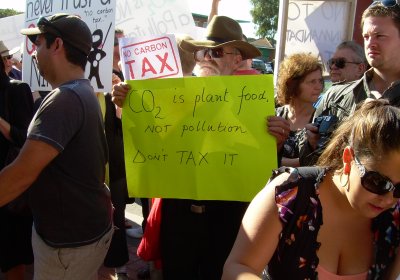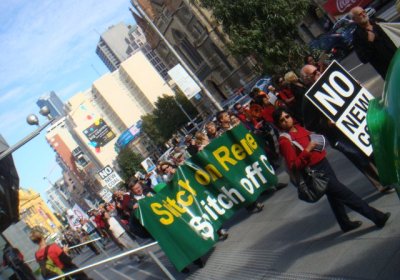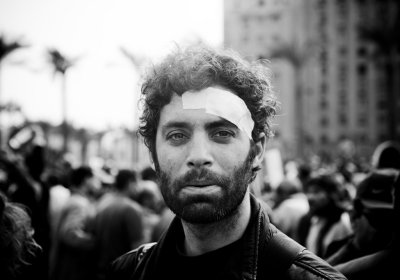Global warming deniers are a dime a dozen in comments posted on the web.
From the ignorant to the willfully misleading, these deniers rarely manage to dent the confidence of someone with a good grasp of how the greenhouse effect works. But then, climate activists and scientists aren't their target.
Global warming deniers scream about the supposed lack of scientific facts and “proof”, but evidence continues to mount for global warming and its effects.
877
About 200 people protested outside Victorian government offices on April 11 against a proposed new gas-fired power station in Victoria. Five protesters locked themselves to a stepladder inside the building.
The company HRL is planning to build its power station in Victoria, and the state and federal governments have committed $150 million towards it.
The rally came at the end of the National Grassroots Climate Summit in Melbourne. The protest called for funding to be put toward renewable energy instead.
In the early morning of April 9, new battles broke out on the streets of Cairo. Protesters fought back against mass repression carried out by the army, leading to two deaths.
In a fresh victory for people’s power in Egypt, protesters defeated the crackdown.
Protesters were demanding former dictator Hosni Mubarak and all corrupt officials from his regime be charged. Protesters remained in Cairo’s Tahrir Square late into the night before the army moved in.
Only days before Peru’s general elections on April 10, three protesters were killed and dozens injured by firearm-wielding police near the southern city of Arequipa.
The protesters were taking part in a community uprising against the Tia Maria copper mine proposed by Mexican-based, US-funded Southern Copper. The company has one of the worst environmental track records of any mining company active in Peru.
Fearing that the mine would irredeemably contaminate local water, the residents of Islay took to the streets, despite realising it would put their lives at risk.
Global politics has taken a dramatic turn this year with the uprisings in the Arab world successfully overthrowing dictatorial regimes, and inspiring democracy movements in countries throughout the region.
People who are fed up with corruption, repression and low living standards have stood up and fought for their rights and won many gains. What the movements in the Arab world have shown the people of the world is that no matter how strong governments are, people united in struggle can defeat them.
Peruvians went to the polls to elect a new president on April 10.
In a first round result reminiscent of the 2006 election, the electorate has sent the previously languishing “left-nationalist” candidate Ollanta Humala (of the Gana Peru alliance) through to the presidential runoff on June 5.
As in 2006, Humala will face a candidate representing elite interests: Keiko Fujimori, the daughter of ex-president and architect of Peru’s neoliberal development model, Alberto Fujimori.
Wall Street has continued erecting monuments to its own greed. The British Guardian reported on April 12 that Goldman Sachs’ paid its top five directors almost US$70 million in 2010.
The latest United States Department of Labor’s Bureau of Labor Statistics report, released on 27 July 2010, said civilian workers’ median hourly wage was $16.55. Private industry workers received $15.70 and state and local government workers received $22.04.
The top Goldman Sachs directors, on the other hand, earned an average $38,356 each day for 2010.
With the 25th anniversary of Chernobyl falling on April 26, a debate is brewing over the estimated death toll from the nuclear disaster. The debate has erupted with a heated exchange between prominent British columnist George Monbiot and anti-nuclear campaigner Dr Helen Caldicott.
Monbiot claims the “official death toll” from Chernobyl is 43. Caldicott puts the death toll at 985,000. Someone's wrong. Perhaps they both are.
Opposition to the Brighton bypass bridge over the Jordan River in southern Tasmania escalated after the April 12 decision by the Tasmanian heritage minister Brian Wightman to give final approval for works to proceed.
The bridge will destroy kutalayna, a site of 42,000 years of Aboriginal occupation.
On April 14, protesters entered the site and stopped the works. On April 15, 21 people were arrested after protesters scaled the fence and entered the site in waves, stopping the work on several occasions.
About 15,000 people attended the “No Nukes” protest in the central Tokyo district of Koenji on April 10.
The rally called for assistance to those affected by the March earthquake and tsunami disaster, and for an end to nuclear power. Organisers said more than 1.23 million yen (A$14,000) had been raised for those affected by the disaster.
About 2500 people joined a separate rally in another part of the city calling for the Hamaoka nuclear plant in Shizuoka to be switched off. The Hamaoka plant is on a fault line considered likely to be affected by future quakes.
The Venezuelan government has repeated its request to the United States government for the extradition of terrorist and ex-CIA agent Luis Posada Carriles. Posada Carriles was found not guilty by a Texas court on April 8 of charges of violating US immigration law.
Posada Carriles is wanted by Venezuela for his role in blowing up a Cuban plane in 1976. The plane’s 73 passengers, all civilians, were killed. Posada Carriles escaped from a Venezuelan prison in 1985.
Venezuela’s foreign ministry issued the statement abridged below on April 8.
* * *
Below is an abridged version of a speech by NSW Greens MLC David Shoebridge in Sydney on April 10. The action was part of an international weekend of solidarity calling for an end to the persecution of alleged WikiLeaks whistleblower Bradley Manning. **** First, I'd like to acknowledge that this is Aboriginal land that we are standing on. It always has been, always will be Aboriginal land. And in fact sovereignty has never been ceded over this land that we are standing on here today.
- Previous page
- Page 3
- Next page








